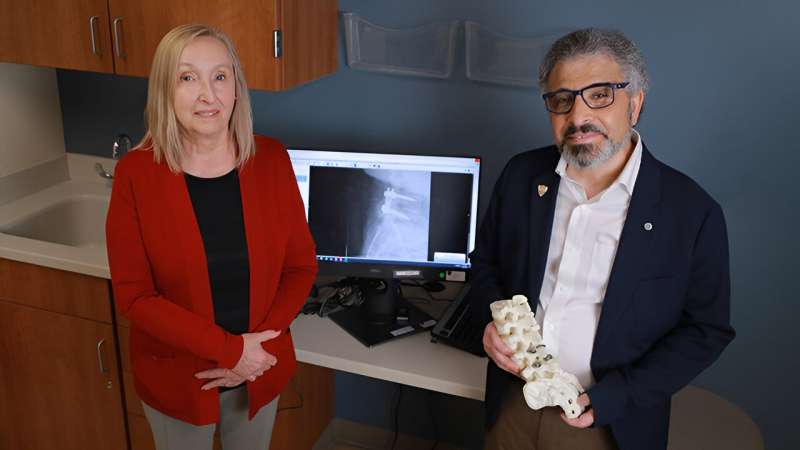This article has been reviewed according to Science X's editorial process and policies. Editors have highlighted the following attributes while ensuring the content's credibility:
fact-checked
trusted source
proofread
Study finds diabetes increases the risk of failure in spinal fusion procedures

A new study from orthopedic researchers at The University of Toledo has found lumbar spinal fusion procedures are far more likely to fail in individuals with diabetes.
The results of the study were published in the journal JBMR Plus and were recently presented at the Lumbar Spine Research Society's annual meeting in Chicago.
"We've known for a long time that diabetic patients are at high risk of infection from any surgery, including spinal fusion," said Dr. Hossein Elgafy, a professor of orthopedics in the College of Medicine and Life Sciences and chief of spine surgery at UTMC. "More recently, however, physicians have taken a closer look at the high rate of failure in those patients. A lot of times the bones simply aren't fusing."
The reason for that, UToledo researchers say, appears to be connected to how diabetes affects bone growth and healing.
In a spinal fusion procedure, surgeons use a combination of screws, rods and bone grafts to join two or more vertebrae together. As the area heals the bones should fuse solidly together, restricting motion and relieving pain.
Sometimes, however, the bones don't properly heal together. Surgeons call that a non-union complication, and it often leads to more pain and the need for additional, corrective surgery.
While a risk for everyone, individuals with diabetes are particularly susceptible.
In a study of more than 500 patients who underwent lumbar spinal fusion surgery at The University of Toledo Medical Center between 2009 and 2017, researchers found individuals with diabetes were nearly three times more likely than those without diabetes to experience non-union complications.
Diabetic patients also were more than two times more likely to experience additional degeneration in adjacent segments of the spine after a spinal fusion procedure—another complication that usually requires extensive revision surgery.
"Diabetes is a metabolic disease, but it's also a bone disease," said Dr. Beata Lecka-Czernik, a diabetes researcher and professor in the Department of Orthopedic Surgery and the study's corresponding author. "It has a very significant role in bone health, and that's what we're seeing here."
In addition to reviewing patient data, researchers also analyzed tissue collected from both diabetic and non-diabetic patients who underwent revision surgeries. Those samples, which contained a mixture of connective tissue and developing bone, provided a unique insight into how the healing process in the two groups differed following spinal fusion surgery.
"The bony samples from diabetic patients had much less developed structure, which means that even if the new bone formation happens, the quality of this new bone will be much worse," Lecka-Czernik said. "This is showing there is also an additional risk factor for spinal fusion complications, which is valuable for orthopedic surgeons to know when treating patients with diabetes."
Spinal fusion is generally a last-resort treatment after physical therapy and pain management strategies have failed to bring relief. Even so, it's a common surgery with hundreds of thousands of procedures performed every year in the United States.
Diabetes is an independent risk factor for lower back disc degeneration—one of the most common reasons for spinal fusion surgery. With the rate of diabetes increasing in the United States, the number of spinal fusion procedures is likely to continue climbing as well.
That makes it all the more important to identify and overcome the challenges unique to that patient population, Elgafy said.
"We've spent 20 years improving our techniques, our hardware and our technology," he said. "Now the new wave in spine surgery is bone health. How do we improve bone health before we take people into surgery? It's an important question as we look to improve surgical outcomes and avoid patients having a second or third surgery. This study is an important first step."
Elgafy said surgeons do have some tools at their disposal to reduce the risk of failure in diabetic patients, such as ensuring A1C and blood glucose are well-controlled prior to and after the procedure, and exploring biological scaffolds and other therapeutic agents to support new bone formation at the surgical site.
More information: Claire Wilson et al, Diabetes increases risk of lumbar spinal fusion complications: association with altered structure of newly formed bone at the fusion site, JBMR Plus (2024). DOI: 10.1093/jbmrpl/ziae053




















